- Home
- Taylor Caldwell
I, Judas Page 4
I, Judas Read online
Page 4
“The letter stitched inside your cuff,” he whispered, “there are a hundred like it in this court at this moment, waiting only a leader to avenge the massacre.”
As a shopper approached he quickly resumed his servile manner; but as the man passed, he nodded his head toward a truncated column at one end of the court. “I heard the soldiers laugh,” he muttered between his teeth, “as they dropped the column on the heads of the Galileans, crushing a score or more to death.”
I studied this odd figure of a man for a long moment, realizing that it was no stroke of chance that he had singled me out.
“How do you know I am not a Roman spy?”
He laughed, showing his yellow teeth. “Not with that face. Only a Pharisee could have that constant look of smelling something bad. The upturned nose and arched eyebrows are more of a badge than the striped sleeve of this haughty sect.”
“You know my name?”
He nodded slyly. “We wait for a leader.”
“I am not he.” He had drawn me off to a corner and kept digging new wares out of heaping baskets.
He held up a white silk robe, similar in quality to that worn by Annas and his son-in-law. “How do you like this garment?” He laughed over a hoarse whisper. “Tonight, in the Garden of Gethsemane, in the great room of the olive presses, the Maccabeans will gather.”
Abruptly, his manner changed again and he began to gesture wildly, berating me rudely at the same time. “Why I wasted my time with such as you,” he cried, jamming his goods back into his baskets.
I was about to respond angrily when I caught his eye and looked back over my shoulder. A Levite with the red badge of a Temple collector had been nosing through the adjacent stall. His eyes ran over my cloak, dwelling for a moment on the striped blue sleeve, and he gave me a respectful nod. He was less circumspect with the merchant. “Your licenses,” he demanded.
With much grumbling, the man fished out the required documents for each commodity offered for sale. The collector perused them carefully, and then, like all petty officials, anxious for the last word, left with the injunction: “Don’t let me see you annoying anybody with proper business in this Temple, or it will go bad for you.”
The merchant followed the retreating figure with a sour eye. “They are worse than the Romans, these lackeys who do Rome’s bidding.”
In spite of myself, I started, for this ugly-visaged, crude, coarse stranger had echoed almost to the letter my own thoughts about the High Priest and his cohorts.
“What name do you go by?”
“Joshua-bar-Abbas.”
“And the watchword is what?”
“You do well to ask, for without it you could not approach the Garden of Gethsemane.” He lowered his head. “Simon,” said he, “Simon the Zealot.”
I didn’t give him a second look, but went on my way, oblivious to the hawking cries of the merchants. How many of these, I wondered, were, like Joshua-bar-Abbas, part of the underground resistance against Rome? It was a stirring thought, and for a change I did not bridle as a pair of helmeted soldiers swaggered noisily by with their broadswords clanking on the cobblestones and two shameless daughters of Israel on their arms.
Soon I was out of the Temple and in the city I loved. I never ceased to thrill as I wandered these familiar streets. In the Upper City, near the Temple, dwelt the aristocracy, enjoying the purified air at rarefied altitudes of more than twenty-five hundred feet. The new quarter stretched ahead of me, past the Sheep Gate and the wall paralleling the Valley of Kedron. I passed the Dung Gate, beyond which a trickling stream ran with its stench of urine and offal through the gutters, and where the lepers, forbidden the city, clustered together in their misery hoping for a miraculous cure in the holy water of the pool. On the far side of the Kedron, at the foot of the Mount of Olives, were a collection of storehouses for the hides of the sacrificed animals. I held my nose passing the Dung Gate, for all the garbage of Jerusalem was carried out here and flung into the Kedron Valley. Just outside the walls I saw the beggars poking for food through the stinking debris piled up in the dingy alleys behind the warehouses. The Kedron’s brook was tinged with the blood of the sacrificial animals, and I stopped for a moment to observe the racing stream.
“Someday,” said a strange voice, “this stream shall run red with a different blood.”
I turned and saw two hazy figures in the gathering darkness. Though the cool of evening had not yet set in, I felt a chill down my spine. And then quickly I shook off my uneasiness. How had the voices carried so clearly? I must surely have imagined it.
The streets were quiet before the evening meal. And looking at the rows of yellowish stone houses, jammed together except for the spacious Roman homes and the palaces of Jewish dignitaries, I recalled the saying that a man could walk for miles over the expanse of these flat, earth-covered roofs.
Quickly I left the quarter, with its unsavory odors, and soon burst upon a rich residential area ablaze with the bloom of red poppies, soft blue lavender, and lilies of the valley. Farther along I came on beds of cumin and sharp peppermint, intoxicating ginger and nutmeg, branches of saffron, oleander, and cypress, all adorning the gardens of the rich. Their sweet fragrance made one forget the hideous running sores of the grotesque lepers with their lion-shaped faces, and the ragged beggars with their grimy hands out for alms. On some mounds rising above the limestone homes, I spotted the aromatic helboh and lebonah, ground and dried into incense for the Temple services. Would that the spirit of Israel were as fruitful as its land.
I must have walked for hours, for my mind was seething with the new life I was about to begin. Where it would take me I had no way of knowing. But I did know I was about to meet my savior, the Messiah of Israel, of that there was no doubt! For even as a boy, listening to the muted discourse of my father and his friends, I knew that I was born to serve him one day. That was my destiny, and there was no denying it. Did not the book of our fathers say that the Philistine struggled against his stars to no avail? We could choose our way, to be sure, but it was a way already marked out for us. The elders had set me on the path, and the Promised One beckoned, yet, as Isaiah said, I knew him not. But the instant my eyes fell on him the curtain would be drawn. He was my Master, and I would die for him if need be.
The Baptist, they said, was an Essene. I had pictured the Savior as somebody not quite as austere. Still, with all my disapproval of the High Priests, I knew the Reb Gamaliel was right in saying that Jews had to unite in the common cause. We were already a nation divided, making it unnecessary for the Romans to implement their policy of Divide and Conquer. Still walking briskly, I took stock of the differing groups and their philosophies. The Pharisees felt that fate dictated all matters and that nothing could happen to man which was not governed by this fate. But unlike the Greeks, who considered the character of the individual the determining factor, the Pharisees believed this fate was not a mindless force, any more than the movement of the planets or the rhythm of the seasons. It was all God’s design, and as we drew closer to the designer, understanding him as we grew to understand ourselves, so did we comprehend his purpose.
I was intrigued by this philosophy, but it seemed the highest indulgence of the ego to believe that God was interested in the trivial course of each and every life. What was it to God that I was betrothed to Rachel-bas-Nathan and was bored to distraction? I am sure very little. Why else were there prophets if God spoke to all? Surely, he would not have selected a Chosen People if the Gentiles were as dear to him.
The Essenes had no love for the Sadducees, for the Temple hierarchy denied divine intercession in the affairs of man, holding every man free to choose his own course. They had no concern with morality, saving that God was not moved by the sins of humanity, and so, said the Essenes, it was easy to see why the Sadducees behaved as they did. They paid a grudging respect to the Pharisees for a fanaticism which they could appreciate if not agree with. Like the Pharisees, as well, they accepted the message of the Prophets
as part of the gospel. The Sadducees cynically accepted only the five books of Scripture till Moses’ time, excluding even the prophets who foresaw the Messiah. For their authority they fell back on the Scribes, who had worked hand in glove with them from the Babylonian Captivity four hundred years before. There was a saving in Jerusalem that when a Sadducee ate, a Scribe belched for him. I liked neither the Scribes’ cynicism nor their sophistication, for they made a syllogism of everything, including the tyranny of Rome.
I was so lost in thought that I did not remember passing the Roman Forum and Theater, which patriotic Jews shunned like a roasted pig. But after a while, passing Herod’s palace, I came to my father’s house. From the street it did not appear expansive, for wise Jews concealed their wealth from the hungry wolf. But as I unlocked the gate, and walked through an open corridor, I emerged into an atrium which overflowed with an abundance of cypress, palms, and karob trees, gathered about a cluster of marble fountains. My dear father, God bless him, had been Hellenized in his later years and cultivated a taste for Greco-Roman statuary.
“Take the best of every culture,” said he, “and use it to your advantage.”
I paused at the door. I had already gone over my excuses to Rachel and my mother. We had planned to dine with friends, but my mind was drawn like a magnet to the Garden of Gethsemane. The Zealots from all of Palestine and their sympathizers as well would be on hand, for Pilate’s show of might had precipitated a crisis of action. It would not do for Rome to think us all cowards.
My mother was first to greet me. There were anxious lines in her worn face as she took my hand and lightly kissed my cheek. “You are home so seldom these days,” she sighed in reproach.
Over her shoulder, I saw the lovely face of my betrothed. “Rachel,” I cried, “you grow in beauty every day.”
She flushed prettily and her hazel eyes brightened.
“How would you know, Judah, when you are here so seldom?”
“You question my work?” I asked more harshly than I intended. “How would we live if not for my father’s estates?”
My mother gave me a sidelong glance. “Simon the Cyrene was here earlier.”
“Oh, that pleasure-monger,” I said carelessly, “what new disaster does he report?”
The Cyrene, so styled because of his hedonistic philosophy, had been my father’s overseer for years, and continued after his death to serve me.
“He worries,” she said, “that he so seldom sees you.”
“It is a cheerless trip to Kerioth, and he can as easily bring his problems to Jerusalem.”
Rachel pouted, her upturned nose in the air.
“I am becoming an old maid, and you do not even notice.”
“I know,” I laughed, “and you almost sixteen.”
“And you an old man of almost thirty.”
“Not quite. Please don’t age me before my time.”
My mother smiled mirthlessly. “I am afraid that I am the one feeling the years.”
The servants brought refreshments into the library, my favorite room, where my father and I had argued history into the small hours of the night.
I sipped slowly from a fine Syrian wine.
“I cannot sup with you, Mother, as much as I had hoped to.”
Her voice trembled a little. “But, Judah, you cannot disappoint your guests. They will be expecting your announcement.”
“What announcement, Mother?”
The cup slipped out of Rachel’s hand and smashed on the tile floor.
“He does not even remember,” she cried.
“You were to announce your wedding date.”
I sighed with regret. “I cannot be here tonight, Mother. I am sorry, Rachel.”
Rachel appeared stricken. Her bosom heaved with emotion and she fought off tears. “If you do not want me, say so, Judah. I know that I am only a poor relative, an object of charity since my parents died.”
My mother reached for her hand. “You are my own child, the daughter I never had.”
I found the situation embarrassing.
“I must meet later with the Reb Gamaliel. He has tidings to discuss.”
“And when did you see him?”
“Only today,” I replied truthfully, “but there were others about. You know what a friend he is, and how he wants to further my career.”
She frowned. “Is not your father’s fortune ample for us all?”
“I cannot help it, I must be there tonight.” I resented having to lie when no excuse should have been necessary. “Why do you not tell them the date in my place?”
My mother had a pained expression. “But you, Judah, are the head of the house.”
As always, when unfairly pressed, I lost my composure. “Then allow me to be the head of the house.”
My dear, kind, sweet mother rose from the couch and took Rachel by the hand. “Come, child, we must see to the supper. The guests must not be disappointed.”
There she was, as usual, forcing me to feel guilty.
“I want to marry Rachel,” I said.
My motlier spoke without turning her head. “And will you be as mysterious with her about your movements?”
I moved to kiss Rachel but she tossed her head, tumbling her magnificent auburn hair about her shoulders. I had never seen her more beautiful and I felt a sudden yearning for the slim, taut body so voluptuously silhouetted under the gossamer gown.
“Come, Rachel,” repeated my mother. “Judah has business elsewhere.”
Women were unreasonable, forever immersed in their own little desires, not once even thinking of the needs of the nation. As for God, what was he to them but a word? They stood upstairs in the synagogue, frowning over the sacred scrolls to steal a look at their menfolk praying so solemnly below. They cared nothing for the Messiah. It mattered little to them whether he appeared or not. Give them their daubs and their oils, to paint and glorify face and body, and they were blissfully occupied. I could not be concerned with this frivolousness when whispers of the Messiah were in the air, carried to every part of the land by the prayers of his people.
“Deliver us, O Deliverer, for we are yours.”
Supperless, but too excited to care, I proceeded by foot for Gethsemane. Taking the shortest route across the city, I passed through the public concourse separating the Temple from the Fortress, and emerged by the Golden Gate into the gardens and groves which ascended into the mountains. It was a shadowy night, the moon flitting in and out of the silver clouds, and by the dim light I could make out three crosses with a figure straining from each beam. They were not dead yet, for I could hear their moans. They had been hung upside down, as was customary’ with brigands caught in a murderous act. From their cries I knew they would dangle till morning before the Roman soldiers broke their legs and put them out of their misery.
I would have given them a little wine, if I had it, and some comfort, if I had the time. But these bodies hung on trees all over Judea, filling travelers with fear. The Romans didn’t believe in prisons. They were a waste of time and money. “Why feed a dead horse?” Pilate asked.
The Garden of Gethsemane, with its gnarled old olive trees and abandoned warehouses, had always fascinated me. It had such a deserted air that I shivered at times in passing. It gave me the uneasy feeling of having been there before. I suppose if one believed in reincarnation it was quite possible that some half-forgotten memory of another lifetime lingered in the storehouse of the mind. However, while my Pharisee schooling allowed me to ruminate on the idea of continuing life, this was the only life I was sure of. If this life didn’t count, how could any other?
Lost in these thoughts, I was startled by a dark figure jumping out from behind a clump of trees.
“Give the word,” a rough voice challenged. I felt the flat of a sword against my chest and instinctively drew back.
“Simon the Zealot.”
“Pass, Judah-bar-Simon. You are late.”
By the light of the moon, straining my eyes, I made o
ut the sharp features of a Syrian Jew. “They call me Cestus, for I am the cord that ties the dissident patriots together.”
His face had a strength and determination, even in that murky light, that I found reassuring.
“You are the last,” he said, “but I must stay until I am relieved.”
He drew his hand across the blade of his sword. “It will go ill with any trespasser.”
I followed the path he indicated. Three times I was challenged before I reached the abandoned warehouse, ringed with armed sentries. I was searched at the door and a dagger removed from my tunic.
“I am a Zealot,” I said angrily.
“We are all Zealots,” the sentry said, “and the rules are the same for all, even for Simon Zelotes.”
“What if the Romans were to break into the meeting?”
He smiled. “We have a man behind each tree. The movement is growing, brother. The time approaches.”
“Good man.” I clapped his shoulder. “This is the talk I would hear.”
He passed me into the building. It was brighter than I would have expected. The light came from small lamps which, from the odor, were burning the black tar scooped from the soil of Persia and the Sinai. My entrance occasioned no interest. Not a head turned. There were possibly a hundred people sitting around on the floor of the spacious room, listening to a man of imposing presence. From his slurred speech it was plain that he was a Galilean. But he spoke with the assurance of one from the tribes of Israel. And in truth there were some in Galilee of the seed of Abraham, whose fathers had resettled there after the Maccabeans had driven off the Syrians and Aramites who would not be circumcised.
He, too, had been in Rome and was appalled by the corruption, the preoccupation with vice, and the rampant homosexuality. “The ruling class has grown soft with luxury. They diddle in their baths all day, playing with their little nymphets, and allowing ambitious upstarts, such as the grasping Sejanus, to handle the affairs of state. The lower classes have become mobs and have lost the desire for work. In Judea there is a saying that a father who does not teach his son a trade teaches him to be a thief. But in Rome they idle all day, robbing and fornicating in their shiftlessness, supported by the largesse of a timorous government which keeps their minds busy with games and their bodies inert with free grain and meat.”

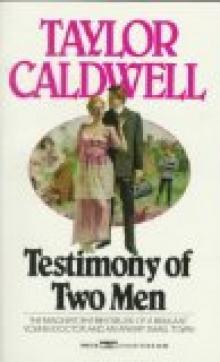 Testimony of Two Men
Testimony of Two Men Wicked Angel
Wicked Angel The Arm and the Darkness
The Arm and the Darkness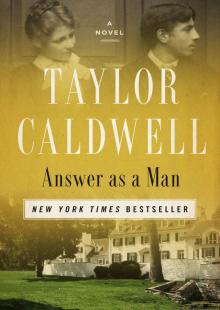 Answer as a Man
Answer as a Man Grandmother and the Priests
Grandmother and the Priests On Growing Up Tough: An Irreverent Memoir
On Growing Up Tough: An Irreverent Memoir Ceremony of the Innocent
Ceremony of the Innocent The Listener
The Listener Bright Flows the River
Bright Flows the River The Earth Is the Lord's
The Earth Is the Lord's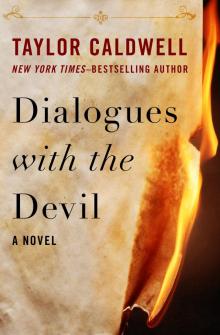 Dialogues With the Devil
Dialogues With the Devil A Tender Victory
A Tender Victory This Side of Innocence
This Side of Innocence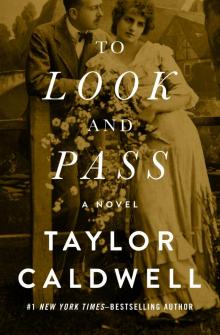 To Look and Pass
To Look and Pass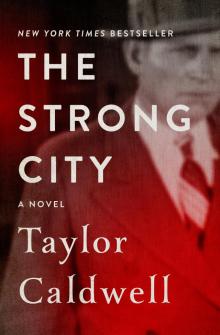 The Strong City
The Strong City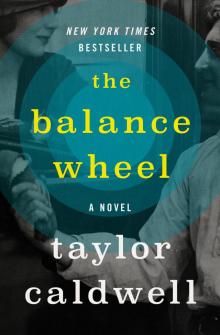 Balance Wheel
Balance Wheel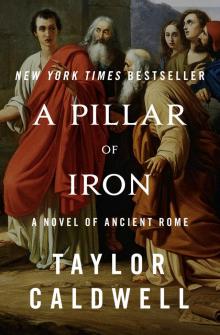 A Pillar of Iron: A Novel of Ancient Rome
A Pillar of Iron: A Novel of Ancient Rome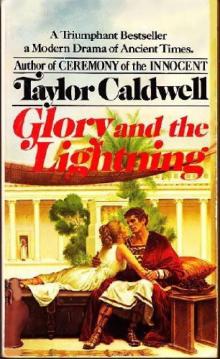 Glory and the Lightning
Glory and the Lightning Dear and Glorious Physician
Dear and Glorious Physician The Wide House
The Wide House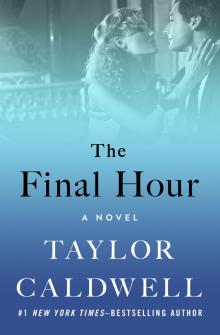 The Final Hour
The Final Hour Never Victorious, Never Defeated
Never Victorious, Never Defeated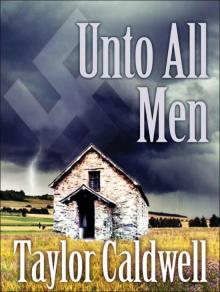 Unto All Men
Unto All Men The Turnbulls
The Turnbulls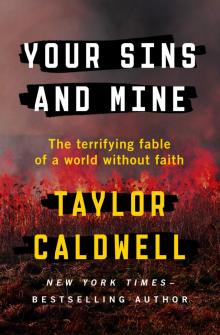 Your Sins and Mine: The Terrifying Fable of a World Without Faith
Your Sins and Mine: The Terrifying Fable of a World Without Faith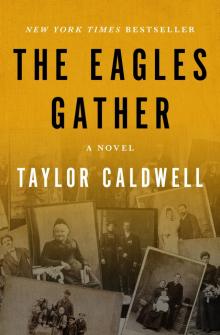 The Eagles Gather
The Eagles Gather Let Love Come Last
Let Love Come Last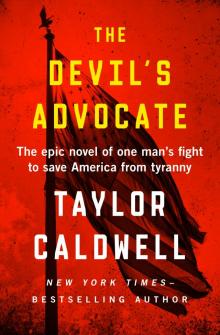 The Devil's Advocate: The Epic Novel of One Man's Fight to Save America From Tyranny
The Devil's Advocate: The Epic Novel of One Man's Fight to Save America From Tyranny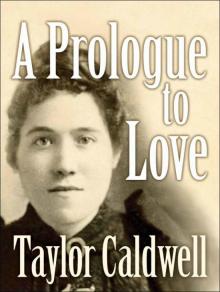 A Prologue to Love
A Prologue to Love Maggie: Her Marriage
Maggie: Her Marriage The Late Clara Beame
The Late Clara Beame Melissa
Melissa Great Lion of God
Great Lion of God Captains and the Kings
Captains and the Kings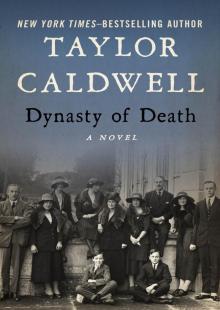 Dynasty of Death
Dynasty of Death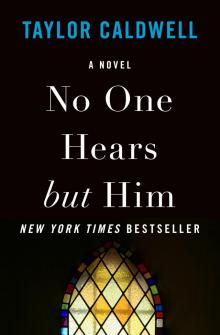 No One Hears but Him
No One Hears but Him The Sound of Thunder
The Sound of Thunder There Was a Time
There Was a Time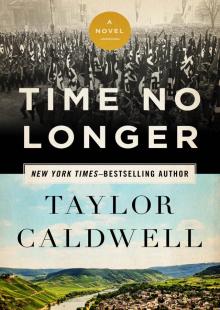 Time No Longer
Time No Longer I, Judas
I, Judas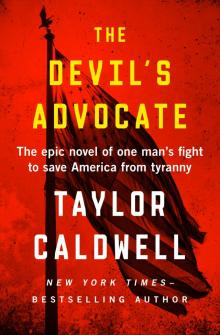 The Devil's Advocate
The Devil's Advocate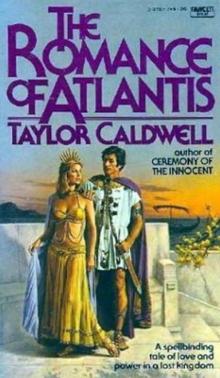 The Romance of Atlantis
The Romance of Atlantis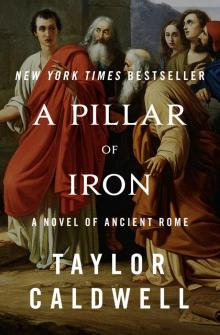 A Pillar of Iron
A Pillar of Iron On Growing Up Tough
On Growing Up Tough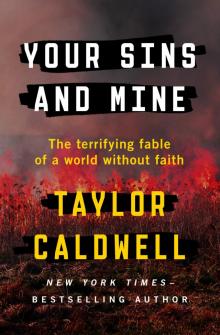 Your Sins and Mine
Your Sins and Mine